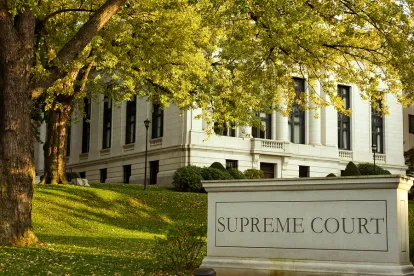Highlights
The U.S. Supreme Court adopted a restrictive view of federal jurisdiction to review an arbitrator’s award under the FAA, requiring an independent basis for federal jurisdiction for the petition
Circuit courts have been split over whether the standard for federal court jurisdiction to compel arbitration was also the standard for federal jurisdiction over petitions to enforce or vacate an arbitrator’s award
Some petitions previously brought in federal court must be brought in state court
The U.S. Supreme Court recently provided clarity on when a litigant may petition a federal court to vacate, modify or affirm an arbitrator’s award under the Federal Arbitration Act (FAA). The decision in Badgerow v. Walters et al., resolved a split among circuit courts of appeals regarding the proper standard to apply when determining if federal jurisdiction exists.
The Supreme Court held that a federal court may exercise such jurisdiction and review only if there is an independent basis for federal jurisdiction asserted on the face of the petition.
The split among the circuit courts involved whether the FAA’s standard for federal jurisdiction when seeking review of an arbitrator’s decision is the same as the standard for jurisdiction over a petition asking a federal court to compel arbitration.
In the latter circumstance, the court is required to look at the underlying dispute and determine if there would be a basis for a federal court to hear the case if it were not subject to mandatory arbitration. For instance, if the parties were of diverse citizenship and the amount at issue met the diversity jurisdiction threshold, or the underlying dispute involved a federal question, then the federal court may properly entertain the motion to compel arbitration under the FAA.
However, the Third Circuit and the Seventh Circuit have differed from the First, Second, Fourth, and Fifth Circuits regarding the proper standard for federal jurisdiction under the FAA when reviewing an arbitrator’s award. The Third and Seventh Circuits took a more restrictive view and held that for a federal court to have jurisdiction to review, vacate or enforce an arbitrator’s decision, there must be a basis asserted on the face of the petition.
Those courts said, for example, the parties must have diverse citizenship (and the required amount in controversy) or the petition to the court to vacate, modify, or confirm an arbitrator’s award must expressly raise a federal legal issue. This more restrictive jurisdiction requirement was grounded in the text of the FAA: one section provided for authority to compel arbitration and another provided for petitions to enforce, vacate or review arbitration awards. By contrast, the First, Second, Fourth, and Fifth Circuits adopted a more generous rule for jurisdiction and applied the same standard applicable to petitions to compel arbitration.
The Supreme Court in Badgerow put this question to bed. It adopted the more restrictive position of the Third and Seventh Circuits, holding that the FAA provides two distinct standards for federal jurisdiction – a more generous standard for petitions to compel arbitration, which found jurisdiction so long as the underlying claims could be brought in federal court, and a separate, more restrictive standard for petitions for review of an award, which requires that there be an express basis for federal jurisdiction set out in the petition for review. In agreeing with the Third and Seventh Circuits, the Supreme Court held that because separate sections of the statute specify the authority to compel arbitration and the authority to review an arbitrator’s award, different standards for the existence of federal jurisdiction apply to those two sections.
The upshot is that now just because a federal court had jurisdiction to compel arbitration does not automatically mean that the same court would have jurisdiction to vacate, modify, or confirm the award. It also means that many such petitions that have been brought in federal court must now be brought in state court.
With the prevalence of arbitration agreements continuing to rise, federal courts increasingly are called upon to be involved in some manner in giving effect to the parties’ agreement to arbitrate. The Supreme Court’s decision in Badgerow provides clarity on when it is appropriate for federal courts to involve themselves in these disputes, and makes clear that federal court jurisdiction to compel arbitration is much broader than federal court jurisdiction to review an arbitrator’s decision.






 />i
/>i
